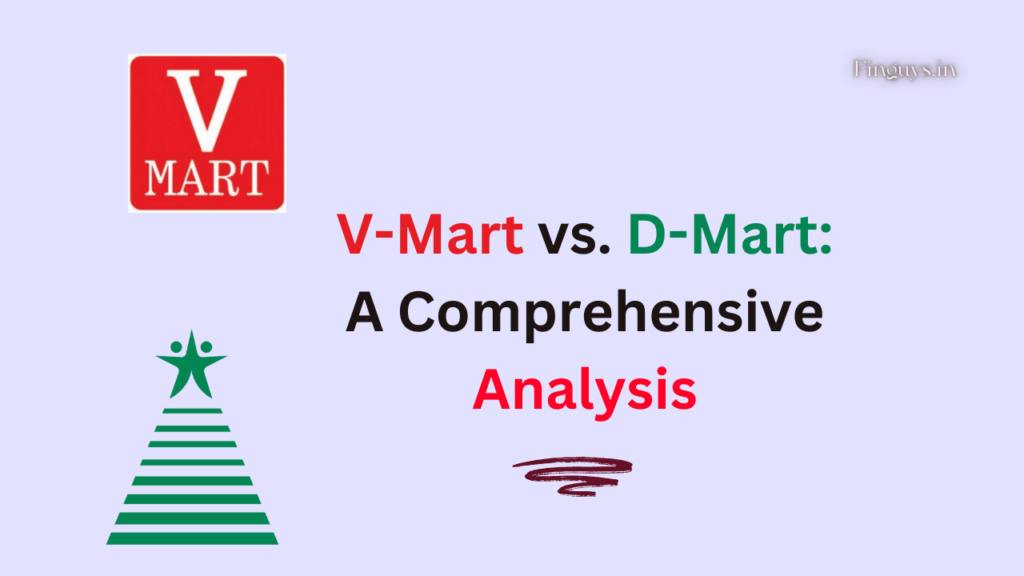The Indian retail sector has been witnessing a dynamic shift, with giants like V-Mart and D-Mart carving out unique niches. While both brands excel in value retailing, their strategies and market focus differ significantly. Here’s a detailed comparison to understand these retail leaders better.

V-Mart: Affordable Fashion for Emerging Markets
V-Mart Retail specializes in value retailing, predominantly targeting tier-II, III, and IV cities. It offers a mix of apparel, non-apparel items, and kirana products, positioning itself as a one-stop shop for affordable essentials.
Key Highlights:
- Store Formats: Aspire (trendy fashion), Plus (basic needs), Corporate (workwear).
- Revenue Split:
- Apparel: 82%
- Non-Apparel: 9%
- FMCG: 9%
- Customer Base: 33 million offline-first registered customers.
- Geographical Reach: Dominant presence in Bihar, Uttar Pradesh, Tamil Nadu, and Jharkhand.
- Pricing Strategy: Affordable range, with apparel priced between ₹80-₹800.
Financial Snapshot (FY24):
| Metric | Value |
|---|---|
| Market Cap | ₹7,484 Cr. |
| Revenue (TTM) | ₹3,005 Cr. |
| Current Price | ₹3,780 |
| Debt-to-Equity | 2.27 |
| Return on Equity (ROE) | -12.1% |
D-Mart: The King of Operational Efficiency
Avenue Supermarts Limited, operating as D-Mart, focuses on urban and metro markets with its “Everyday Low Cost – Everyday Low Price” philosophy. Its strength lies in operational efficiency and an owned-store model, ensuring consistent cost advantages.
Key Highlights:
- Product Categories:
- Foods: 56%
- Non-Foods (FMCG): 21%
- General Merchandise & Apparel: 23%
- Store Network: 383 stores as of November 2024, using a cluster-based expansion model.
- E-commerce Presence: Operates “DMart Ready” in 23 cities, with 21.8% growth in H1 FY25.
Financial Snapshot (H1 FY25):
| Metric | Value |
|---|---|
| Market Cap | ₹2,21,789 Cr. |
| Revenue (TTM) | ₹54,813 Cr. |
| Current Price | ₹3,408 |
| Debt-to-Equity | 0.04 |
| Return on Equity (ROE) | 14.5% |
Side-by-Side Comparison
| Feature | V-Mart | D-Mart |
|---|---|---|
| Market Focus | Tier-II, III, IV cities | Metros and urban clusters |
| Product Mix | Apparel-focused (82%) | Food-focused (56%) |
| Pricing Strategy | Affordable | Value-for-money |
| E-commerce Presence | LimeRoad marketplace | DMart Ready |
| Expansion Strategy | Leasing model | Owned-store model |
| Debt-to-Equity Ratio | High (2.27) | Low (0.04) |
| Return on Equity | Negative (-12.1%) | Positive (14.5%) |
Expert Insights
Strengths:
- V-Mart:
- Stronghold in underpenetrated markets.
- Affordable fashion caters to price-sensitive customers.
- Adaptable store formats meet diverse demographic needs.
- D-Mart:
- Unmatched operational efficiency ensures profitability.
- Wide product range attracts diverse customer demographics.
- Strong financials with minimal debt underpin long-term stability.
Challenges:
- V-Mart: High debt-to-equity ratio and negative ROE pose significant financial risks.
- D-Mart: High valuation may limit short-term investment appeal.
Investment Perspective
- D-Mart is a safer bet for long-term investors seeking stability and consistent growth. Its operational metrics and robust financial health make it a strong contender in the retail space.
- V-Mart offers a high-risk, high-reward proposition with its focus on untapped smaller markets. However, investors must weigh its financial challenges before committing.
Disclaimer
FinGuys.in and its authors are not SEBI-registered financial advisors. This analysis is for informational purposes only and is not financial advice. Please consult a SEBI-registered financial advisor before making investment decisions.
Pingback: GIC Re: A Potential Multibagger Stock for 2025? - Finguys.in